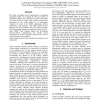Free Online Productivity Tools
i2Speak
i2Symbol
i2OCR
iTex2Img
iWeb2Print
iWeb2Shot
i2Type
iPdf2Split
iPdf2Merge
i2Bopomofo
i2Arabic
i2Style
i2Image
i2PDF
iLatex2Rtf
Sci2ools
SPEECH
2010
2010
Real-time lexical competitions during speech-in-speech comprehension
This study investigates speech comprehension in competing multi-talker babble. We examined the effects of number of simultaneous talkers and of frequency of words in the babble on lexical decision to target words. Results revealed better performance at a low talker number (n = 2). Importantly, frequency of words in the babble significantly affected performance: high frequency word babble interfered more strongly with word recognition than low frequency babble. This informational masking was particularly salient for the 2talker babble. These findings suggest that investigating speech-in-speech comprehension may provide crucial information on lexical competition processes that occur in real-time during word recognition.
| Added | 30 Jan 2011 |
| Updated | 30 Jan 2011 |
| Type | Journal |
| Year | 2010 |
| Where | SPEECH |
| Authors | Véronique Boulenger, Michel Hoen, Emmanuel Ferragne, François Pellegrino, Fanny Meunier |
Comments (0)

